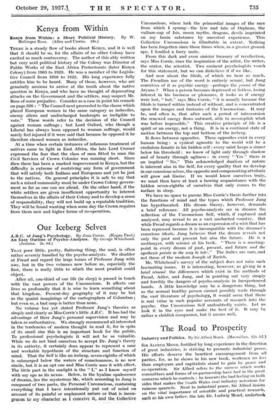Kenya from Within
Kenya from Within : a Short Political History. By W. McGregor Ross. (Allen and Unwin. 18s.)
THERE is a steady flow of books about Kenya, and it is well that it should be so, for the affairs of no other Colony have
excited so much controversy. The author of this ably written but very acid political history of the Colony was Director of Public Works of the East Africa Protectorate (later Kenya Colony) from 1905 to 1923. He was a member of the Legisla- tive Council from 1916 to 1922. His long experience fully entitles him to be heard. Many of those, however, who are
genuinely anxious to arrive at the truth about the native question in Kenya, and who have no thought of deprecating attacks on the Government and the settlers, may suspect Mr. Ross of some prejudice. Consider as a case in point his remark on page 826: " The Council next proceeded to the clause which placed European women in the same category as imbeciles, enemy aliens and undischarged bankrupts as ineligible to vote." These words refer to the decision of the Council against woman suffrage ; but Lord Oxford, who though a Liberal has always been opposed to woman suffrage, would surely feel injured if it were said that because he opposed it he therefore classed women as imbeciles.
At a time when certain instances of infamous treatment of natives came to light in East Africa, the late Lord Cromer expressed the fear that the class of men fitted to man the Civil Services of Crown Colonies was running short. Since then there has been a marked improvement in Kenya, but the difficulty is extreme of contriving any form of government that will satisfy both Indians and Europeans and yet be just to the natives. On general principles it is safe to say that such a mixed community must be under Crown Colony govern- ment so far as one can see ahead. On the other hand, if the white settlers are given insufficient opportunity to interest themselves in the affairs of their Colony and to develop a sense of responsibility, they will not build up a reputable tradition. They will be found wanting when some day the Crown requires from them new and higher forms of co-operation.


























































 Previous page
Previous page